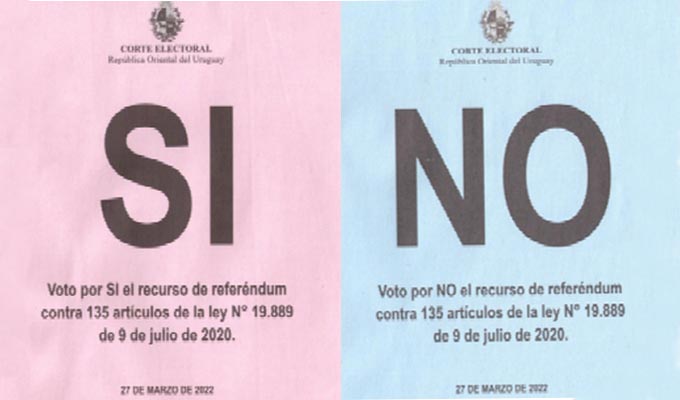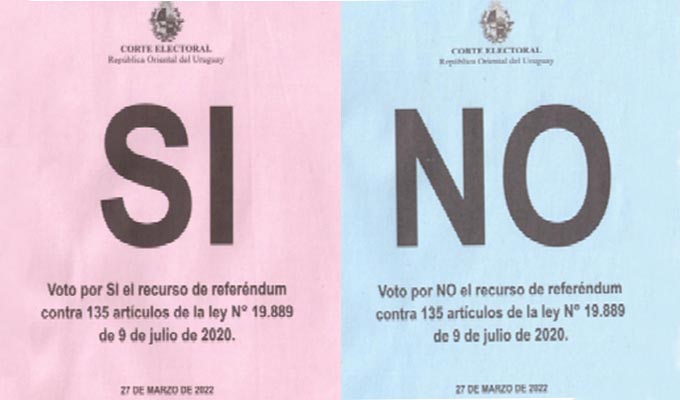
According to data from the Electoral Court, there are 2,684,131 people qualified to vote throughout the country, in Montevideo there are 1,029,113.
The ballot for the “Yes” will win the referendum appeal against the 135 articles of the LUC if it receives 50% of the valid votes plus 1. The valid votes, according to Law 16,017, are those votes for the ballots and also the votes in white.
Voting hours will be from 8 a.m. to 7:30 p.m. The documentation required to pay will be the Civic Credential
If you do not have the physical document, you can pay by stating your name and surname and indicating the series and credential number.
The vote will be secret and mandatory for all those qualified, with no age limit.
For such purposes, the vote-receiving commissions will issue the certificate that accredits the issuance of the vote.
I vote yes
Those who wish to make room for the appeal will vote “Yes” using a pink sheet, which will have the national coat of arms printed in black ink, the expression “Yes” prominently, the legend “I vote YES for the referendum appeal against 135 articles of law
Nº19,889 of July 9, 2020” and the date of the referendum act.
Vote for No
Those who wish to reject the appeal will say “No” using a light blue sheet, which will have the national coat of arms printed in black ink, the expression “No” prominently, the legend “Vote for NO to the referendum appeal against 135 articles of Law No. 19,889 of July 9, 2020” and the date of the referendum.
Blank vote
Votes whose envelopes do not contain voting sheets for the act being held will be considered blank votes.
These votes will constitute a valid vote and they will be considered “No” votes.
annulled vote
It will be considered an annulled vote when they appear inside an envelope:
– voting sheets for Yes and No
-voting sheets accompanied by foreign objects
– Scratched, tested or torn or folded ballot papers that, due to their entity, denote the intention of the voter to identify their vote
-three or more identical leaves.
These votes will not be valid and they will not count for the Yes, nor for the No.
Observed
People in a situation of permanent or temporary motor disability whose circuit appears in the circuit plan as “Not accessible”, may vote as an observer in any circuit that appears as accessible within its series. You must present the civic credential and your signature or digital impression will be required on the identification sheet as contemplated in Law No. 19,790 of August 30, 2019.
The vote must be cast in the circuit to which the voter belongs, with the exceptions of: Members of the Vote Receiving Commissions, electoral officials, custody personnel, if they are authorized to vote, designated facilitators, and in rural circuits, voters of the department not included in the circuit, provided that their civic registration corresponds to a rural constituency of the department and they present the civic credential.
In all these cases, the vote will be admitted as a simple observer, necessarily having to present the credential.
Justifications for not voting
The deadline for submitting applications will be from March 29 to April 27, 2022.
The justification management will be done on the website of the Electoral Court. As long as they are reliably proven, the following extremes will be valid reasons for not complying with the obligation to vote:
1- Suffer from illness, disability or physical impossibility that prevents him from attending the Vote Receiving Commission on the day of the election.
The following may be presented: Medical certificate (if it is issued by a private institution, it must be accompanied by a professional stamp); certificate issued by a care or asylum establishment, in these cases the respective processing may be carried out by the same institution individually or collectively; being out of the country on the day of the election, the people who are out of the country on the day of the election may justify it by any means of documentary evidence showing the date of departure and entry into the country, such as a certificate from the National Directorate of Immigration, stamped passport or tickets that prove said extremes, proof of work abroad, or others of a similar nature.
The term to carry out the justification for this reason will be 30 days from the date of entry into Uruguay. Persons residing abroad must go to the nearest Uruguayan consular office within twenty days before and within twenty days after the election to prove that they are abroad, drawing up the corresponding minutes, which the consuls must send to the Electoral Court within twenty days following its issuance, also delivering to the interested party, an authenticated copy
Being unable to attend the Vote Receiving Commission for reasons of force majeure. People who invoke reasons of force majeure must establish what they are and prove them by means of documentary evidence.
fines
Persons authorized to vote who have not paid or justified their omission must pay the fine, the amount of which will be equivalent to that of a Readjustable Unit (UR), that is, 1,338 pesos, and will be doubled when the omissions are public officials or have the quality of professionals with titles issued by the University of the Republic, that is, one 2,676 pesos.
The payment of the fines will be processed on the website of the Electoral Court.
The voting control period. As of July 25, 2022 and until November 21, 2022, the authorized persons must present proof of the casting of the vote or, failing that, the justification of the cause issued by the respective Electoral Board or the receipt payment of the fine.






